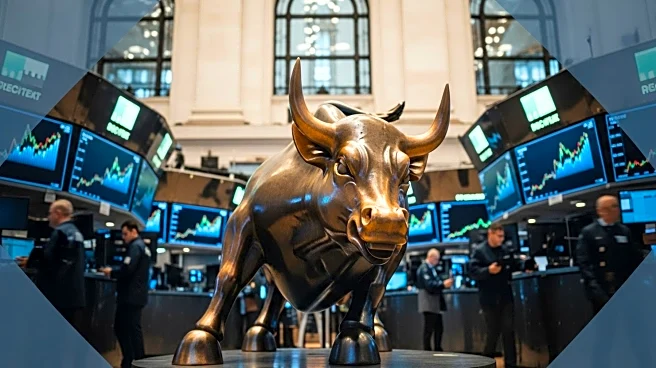What's Happening?
The U.S. stock market has continued to rise, setting new records despite the ongoing government shutdown. The S&P 500 and Dow Jones Industrial Average reached all-time highs, driven not only by Big Tech but also by a broad range of stocks. The Russell 2000 index of smaller stocks has also set a record, marking a significant recovery after nearly four years. Gold prices have hit a record high, and the most popular U.S. bond fund is on track for its best year in recent history. Historically, past government shutdowns have had minimal impact on the stock market, and many investors are optimistic that the market will continue to climb, even after a 35% surge from its low in April.
Why It's Important?
The stock market's resilience amid the government shutdown highlights investor confidence and the potential for continued economic growth. However, there are concerns about the sustainability of this rally, as stock prices have surged faster than corporate profits. The market's optimism is largely based on expectations of future events, such as interest rate cuts by the Federal Reserve and continued growth in corporate profits. If these expectations are not met, the market could face significant challenges. The AI boom is also a critical factor, with hopes that it will drive productivity and offset inflationary pressures.
What's Next?
Investors are closely watching the upcoming profit reporting season, with major companies like PepsiCo and Delta Air Lines set to report earnings. Analysts expect S&P 500 companies to show 8% growth in earnings per share, but they will need to forecast continued growth to maintain market confidence. The Federal Reserve's interest rate decisions will also be pivotal, as traders expect multiple rate cuts by next summer. However, Fed Chair Jerome Powell has indicated that plans may change if inflation remains above target. The AI industry's performance will be crucial in sustaining market optimism.
Beyond the Headlines
The current stock market rally raises questions about the long-term implications of speculative investments and the sustainability of high stock valuations. The AI boom, while promising, must deliver tangible productivity gains to justify current stock prices and mitigate inflationary pressures. The government's fiscal policies and debt levels could also impact economic stability, influencing investor sentiment and market dynamics.











